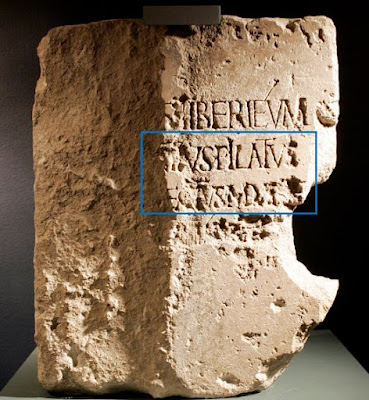In the previous post, the term praefectus, a prefect or governor of a province, was referred to. The image shows a stone discovered in Caesarea Maritima which was the capital of Roman Judaea. It has much of its wording missing and there is considerable conjecture as to precisely what it said. Despite that, the name and political office of one of the most famous prefects of Rome is clearly there.
Below in [square brackets] is what they think it
might say; the parts which are not in square brackets are absolutely clear.
Line 1 [DIS AVGVSTI]S TIBERIÉVM │ possibly referring
to the deified Augustus and Livia, the stepfather and mother of Tiberius;
TIBERIEVM; the stone commemorates the dedication of a building to Tiberius
although what that building was is uncertain since the stone itself was
recycled much later to form part of a staircase.
https://madainproject.com/pilate_stone
There are, however, other intepretations of the first line:
https://www.ministrymagazine.org/.../pontius-pilate-and...
It is, however, the second and third line which are of
interest:
Line 2 [...PONTI]VS PILATVS │ Pontius Pilatus
Line 3 [...PRAEF]ECTVS IVDA[EA]E │ Prefect of Judea
Line 4 [D]E[DIT] (or [D]E[DICAVIT]) │ has given / dedicated
(this); this makes sense because, in this type of inscription, and you find
them a lot on tombstones, FECIT (has made) or DEDIT (has given) or DEDICAVIT
(has dedicated) will appear with reference to the person who organised and / or
financed the project.

No comments:
Post a Comment